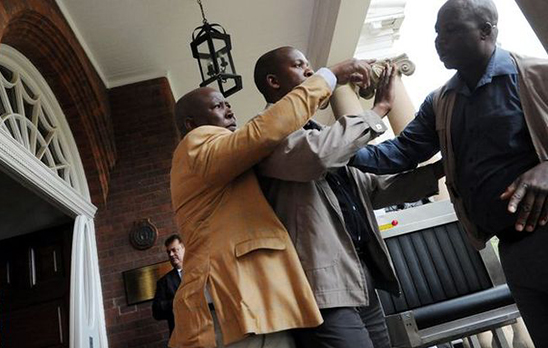With the SABC introducing the local content quota in May, it’s been a hot topic across the media in South Africa. Focal Points* conducted an analysis on the media surrounding the announcement, as well as the potential impact the quota could have.
As a result of globalisation, international influences have become more evident in all aspects of life. Specifically in local music industries, a growing trend exists in the disenfranchisement of musicians and artists. Subsequently, government entities enforce local content quotas to increase the consumption of local music (Maqina, 2013:iv). The South African Broadcasting Corporation (SABC) spokesperson, Kaizer Kganyago, commented that “the SABC is the custodian of our culture and heritage1.” It can therefore be said that government organisations play an essential role in ensuring that the demand for national music is not lost.
Why enforce a local content quota?
Local content quotas emerged in the late 1980s and 1990s as a result of international influences filtering into numerous countries due to globalisation (Chari, 2013:6). Many countries were, and still are, threatened by the power of international cultures impacting the deterioration of local culture. Consequently, the implementation of local content quotas are, to date, experienced worldwide (Richardson, 2006:605). Local content quotas contribute towards creating a sense of national identity and cultural diversity (ICASA, 2014:32). Music, as a cultural product, assists in developing these identities to become more tangible to consumers, consequently providing a platform for the local music industry to grow through the promotion of local talent (Chari, 2013: 6). The Independent Communications Authority of South Africa (ICASA) articulates the role of broadcasters in local content quotas, stating that “radio and television can make a vital contribution to democracy, nation building and development in South Africa ”(ICASA, 2014:5).
Kalawa Jazmee, co-founder of a South African record label, claims that thousands of jobs have been lost in the South African music industry due to local musicians not gaining airplay on national radio stations2. Economic factors play a key role in local content quotas, most notably through the potential growth of the local music industry (Fourie, Mentz, Lloyd & Martini, 2014: 2). As broadcasters comply with the quotas, an opportunity is created for musicians to profit. It is explained that the more a song is played, the more royalties an artist receives and the higher the chances of public interest become (Knab, 2010:1). In addition to artist exposure, local content quotas promote local entrepreneurs and record labels, which in turn create and sustain local jobs3.
Possible impact of local content quotas
Accompanying globalisation is the increased use of mobile technology, television and the internet, ensuring a gradual yet prominent infiltration of international influences. Local content quotas do not exempt local musicians from including elements of international music, nor do they guarantee that local music will preserve national identity or accurately reflect it (Bere, 2008:277; Chari, 2013:30). Subsequently, the opposite desired result could be achieved as the quotas could lead to increased ‘internationalisation’ of local music (Richardson & Wilkie, 2014:2). After the implementation of a 75% music content quota in Zimbabwe, it was found that younger musicians became increasingly culturally ambivalent, as their musical style was neither local nor global (Chari, 2013: 31).
As radio is one of the most accessible forms of media in South Africa, implementing a local music quota will be “far-reaching and have long run consequences4.” However, it is essential to measure whether quotas are receiving the desired result. A study, conducted in 2014 on content regulations in South Africa, proved that content regulations have contributed to the promotion of local music and that a demand for local music does exist (Fourie, et al., 2014: 3-4).
One problem lies in providing quality local music in order to retain a captive audience, as “value for money supersedes poor quality patriotism5.” Besides quality, diversity becomes an issue as certain genres do not have as much recorded music as others, leaving broadcasters with limited availability of music to play (National Association of Broadcasters 2001: 9). Due to local music quotas limiting quality and diversity, losing listenership is expected6.
Consequently, broadcasters may have trouble gaining advertising revenue, as advertisers typically support platforms where they can access the largest possible audience (Richardson 2006: 606).
An issue regarding the supply of quality local music becomes prevalent with the implementation of local music quotas. This creates challenges, but also opportunities for the local music industry to produce higher volumes of quality local music in order to address the increased demand (ICASA, 2014:36). The South African local music industry, although abundant with talent, lacks funding opportunities for artists to grow. “If the SABC is serious about having 90% local content, [they] need to provide resources for the artists. Recording a single track and booking a studio can set an artist back almost R50 0006. Therefore, supply-side initiatives should be put in place by government organisations to create a platform accommodating local artists, meeting the demand at an acceptable quality (Fourie, et al., 2014: 2).
Concluding remarks
International music has been dominating the airwaves for decades, distracting the public from supporting the local music industry, thereby restricting its growth. Furthermore, it is evident that local cultural expression may be compromised by foreign influences. Local quotas can therefore be regarded as a means to safeguard national traditions and promote local talent (Bernier, 2004:3). There will invariably be a period of adjustment, as South Africa has not yet experienced local content quotas to this extent. However, local musicians call on the country to embrace and support the SABC’s decision3. It has been found that local music quotas benefit the country by defending cultural and economic activity; improving public knowledge of local music; promoting diversity; and improving the local recording industry (Maqina, 2013:9-17).
Juliet Harding, member of the South African band Goodluck, states: “We need to stop thinking that because it’s local it’s inferior… We honestly need to look at ourselves and go ‘wow we make the best music’. I call it national pride3.” It is worth noting that no country can exclude the international music community, or prevent it from influencing local music. This paper found that local music quotas, properly enforced and monitored, can help foster a sense of national identity by supporting the local music industry (Chari, 2013: 6). However, the true impact of the 90% local music quota in South Africa is yet to be seen.








